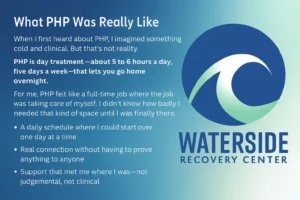Even when you know it’s time, actually stepping into treatment can feel like jumping into cold water. You might be wondering, Will I fit in? Can I handle this? What if I hate it?
I had all those questions, too.
The truth is, I didn’t wake up one day ready to change my life. It was more like I woke up exhausted from pretending I could handle it on my own. That’s when I found Waterside Recovery—and their Partial Hospitalization Program in Plymouth County.
What I want to do in this blog is walk you through what PHP was really like for me. Not the pamphlet version. The lived-in version. Because if you’re scared, uncertain, or trying to picture what treatment might actually look like day to day, you deserve something real.
What PHP Really Means (Hint: It’s Not a Hospital)
When I first heard the phrase Partial Hospitalization Program, I imagined something cold and clinical. I pictured hospital beds and white walls. But that’s not what PHP is.
PHP is day treatment. It’s structured care—usually about 5 to 6 hours a day, five days a week—that lets you go home at night. You’re not staying overnight or cut off from your life. But you are giving yourself a real chance to get grounded and supported.
For me, PHP felt like a full-time job where the job was taking care of myself. I didn’t know how badly I needed that until I was finally in a space where it was okay to just focus on getting well.
A Day in the Life: What My Schedule Looked Like
One of the hardest parts of struggling with addiction or mental health is the unpredictability. You can’t count on your own energy, your own mood, or even your own follow-through.
So when I say that having a daily schedule saved me, I mean it.
Here’s what a typical day in PHP looked like for me:
- Morning Check-In
We’d start with a group check-in—each person shared where they were at. Some people were raw. Others were quiet. There was no pressure to be perfect. Just to show up. - Group Therapy
These weren’t just vent sessions. We talked about shame, boundaries, family roles, relapse, hope, and fear. It was where I learned that I wasn’t the only one who had lied to people I loved—or to myself. - Lunch Break
There was time to step away, breathe, eat. Sometimes I’d go outside and just sit in the sun. Even that felt like a win. - Psychoeducation Groups
This is where we learned. About trauma. About how addiction rewires the brain. About coping skills. Some days I took notes like I was back in school. Other days I just let it wash over me. - Individual Therapy
A few times a week, I met one-on-one with my therapist. That’s where we talked about the hard stuff—my patterns, my fears, and what healing might actually look like.
By the time I left each day, I was tired in a good way. Like I had actually done something that mattered.

You Don’t Need to Be “Ready”—Just Willing
If you’re anything like I was, you might think you have to have it all figured out before you walk into treatment. That’s not true.
I came in unsure, scared, and honestly kind of skeptical. I didn’t know if this would “work.” I just knew I couldn’t keep going the way I was.
The truth? You don’t need to be fully ready. You just need to be willing to show up—even on the days when all you can do is sit there. That counts.
One of my peers said it best:
“I thought I had to be all in, all the time. But PHP let me start where I was. Some days, that just meant showing up tired and staying anyway.”
– PHP Client, 2023
Real People. Real Support. No Judgment.
There’s something powerful about sitting in a room full of people who get it. You don’t have to explain why you spiraled, or how shame makes you lie, or what it feels like to not trust yourself.
They already know.
The staff at Waterside Recovery weren’t distant or cold. They were human. They remembered my name. They noticed if I seemed off. They weren’t there to “fix” me—they were there to help me find steadiness again.
And the other clients? Some of them became close friends. Others didn’t. But all of them made me feel less alone.
Is PHP the Right Level of Care for You?
Here’s how I knew PHP was the right fit:
- I didn’t need detox, but I needed more than just a weekly therapy session.
- I was struggling to stay on track without daily support.
- I was ready to take this seriously, but I still needed to live at home.
If you’re in a similar place—feeling stuck, overwhelmed, but willing—PHP can be a powerful middle ground.
If you’re looking for PHP in Plymouth County or nearby areas like Bristol County, this level of care might be the exact structure and support you need.
What Helped Me Most (It Wasn’t What I Expected)
I thought the therapy would be the most important part. And it was huge. But what really helped me were the little things:
- The routine. Waking up, getting dressed, going somewhere safe.
- The honesty. Being in a space where lying didn’t help you get ahead.
- The grace. Having bad days and still being welcomed back the next morning.
I learned how to rebuild trust—not just with other people, but with myself.
What Happens After PHP?
PHP isn’t forever. It’s designed to be a launching pad. After completing the program, many people step down to Intensive Outpatient Program or outpatient therapy.
Waterside Recovery helped me plan that next step. It wasn’t “Congratulations, you’re cured!” It was, “What kind of support do you need next?”
That question made all the difference.
FAQs About PHP
How long does PHP last?
Most PHP programs last between 2–6 weeks, depending on your needs and progress. I was in for about a month before stepping down.
Is PHP covered by insurance?
Often, yes. I was nervous about this, but the admissions team at Waterside Recovery helped me verify coverage and understand my options.
Can I work while in PHP?
Some people can, depending on the program schedule. For me, it was a full-time commitment. But it was worth the pause.
What if I miss a day?
Life happens. At Waterside, they worked with me to make sure one missed day didn’t throw everything off. But consistency really does help.
Will I be with the same group every day?
Mostly, yes. Having familiar faces each day made it easier to open up and build trust.
What if I’ve already tried treatment before?
You’re not alone. Several people in my group were in treatment for the second or third time. It’s not about how many times you’ve tried—it’s about what you need right now.
You Deserve Support That Meets You Where You Are
If you’re scared to take the first step into PHP, I get it. I was, too. But looking back, I wish I hadn’t waited so long.
I wasn’t “broken.” I wasn’t weak. I was just someone who needed structured support to stop drowning and start rebuilding.
Call (866) 671-8620 to learn more about PHP services in Plymouth County, MA. If you’re ready to feel supported instead of overwhelmed, this might be the place to begin.


